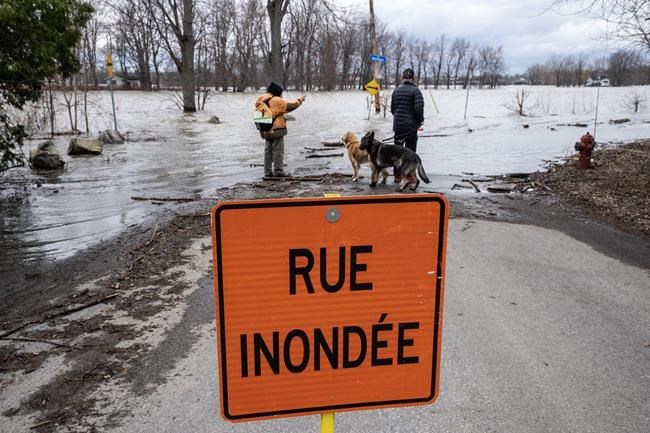MONTREAL — Public safety officials in Quebec say they're hoping for the best but preparing for the worst as the province's spring flooding season begins.
In southern Quebec, warm temperatures and precipitation have led to elevated waterways, Joshua Ménard-Suarez, a spokesman with the Public Security Department, said Tuesday. Ménard-Suarez said the situation was stable, adding that the flooding across the province occurs in the same places every year.
"We've been preparing for weeks," he said in an interview. "It's stable, but if it ends up being more serious, we're ready."
He said officials were paying particular attention to the Outaouais region in western Quebec.
France Bélisle, the mayor of Gatineau, the largest city in the Outaouais, called on citizens to remain vigilant even though weather forecasts were calling for less rain than had been expected earlier in the week.
"Water levels are still rising, but a little slower than expected," she said.
The Ottawa River was rising about one centimetre an hour, Bélisle said, with the peak expected to come between Wednesday and Friday. Water levels, she added, were expected to remain high for several more days, and about 254 buildings were at risk of flooding.
She said the city started distributing sandbags and teams were on the ground monitoring the situation.
Gatineau had major flooding in 2017 and 2019, which affected hundreds of homes.
In Montreal, fire Chief Richard Liebmann said the city opened a flooding coordination centre on Tuesday to help people protect their homes and boroughs and municipalities on Montreal Island protect public property.
However, he said, the weather forecast had brought good news.
"We had a little less rain than expected, so the flows are a bit lower for the next 48 hours than were initially forecast at the beginning of the week," he said.
"That said, we are at the mercy of the weather, so we never know; if there is rain, if there are strong winds, everything could change quite quickly, so we're still asking the public to be ready."
North of Montreal, in Quebec's Laurentians region, several municipalities warned residents to take precautions.
On Monday evening, officials in Mont-Tremblant asked people living on four streets near the Diable River to leave their homes, warning the river would reach flooding levels overnight. City spokesman Maxime Dorais said around 65 residences would be affected, adding the area also includes cottages and a campground.
“It’s not an exceptional situation,” he said in an interview Tuesday, adding that water levels were comparable to those seen almost every year in the city. The voluntary evacuations were a precaution, he said, motivated by concerns emergency services would not be able to reach people in the flooded area.
Quebec’s Public Security Department has said water levels on the Diable River have peaked.
The department reported one major flood in Quebec, in the city of St-Jérôme, north of Montreal, though water levels there were receding. It defines a “major flood” as one that could threaten safety or infrastructure in inhabited areas, one that covers a large area or one that could have a major impact on road networks or electrical services.
The City of St-Jérôme issued a provisional warning Monday evening, asking residents in several parts of the community near the du Nord River to stay tuned for further instructions.
In nearby St-Colomban, a bridge over the du Nord River was closed due to rising water levels.
The Transport Department said seven other roads in the Laurentians and the neighbouring Lanaudière region were closed due to flooding and that traffic was limited on a seventh road.
Roads were also closed in the Abitibi-Témiscamingue and Chaudière-Appalaches regions because of flooding.
This report by The Canadian Press was first published April 18, 2023.
Jacob Serebrin, The Canadian Press




